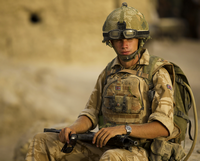On Thursday morning, a bomb exploded in Helmand Province in southern Afghanistan, injuring a British soldier. Two days later, the soldier died at a hospital in Great Britain. He was the 200th U.K. fatality in the eight-year-old Afghanistan war. British newspapers marked the milestone with a flurry of grim news reports. And in short order, fighting claimed four more British troops.
Great Britain has around 9,000 troops in Afghanistan -- the biggest national contingent, after the U.S. British forces are concentrated in the restive south, especially in Lashkar Gah, the capital of Helmand province. U.S. Secretary of Defense Robert Gates said the U.K. military had "more than stepped up" in Afghanistan, in contrast to other NATO armies, that mostly keep their forces confined to heavily fortified bases.
But Britain's vital contribution to the Afghanistan war is increasingly undermined by weakening public support -- and by equipment shortfalls resulting from inadequate investment in the British armed forces. A poll of 2,100 people found that 57 percent wanted the U.K. out of Afghanistan, the Herald reported on Monday. "There is no longer any appetite for this war," wrote Richard North, author of the book "Ministry of Defeat: The British in Iraq 2003-2009."

